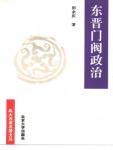Chapter 1 preface
This book discusses the political history of several Jiangzuo overseas Chinese aristocrats combined with Sima's imperial power for more than a hundred years from the early 4th century to the early 5th century.The rise and fall of the elite clans in the Eastern Jin Dynasty and the development and demise of the elite politics can be roughly seen from the internal relationship between the titles in this book.
The first seven topics of this book discuss the history of each gentry's ruling period in order to show the stages of the Eastern Jin Dynasty's clan politics.In order to clarify some relatively obscure historical content, more textual research has been done. On the one hand, the purpose of writing "Hou Lun" is to connect the discussion of the previous topics, so as to clarify the context of the book;
Chinese scholars have different opinions on the politics of aristocrats, and there is no consistent understanding.There are also quite different opinions in foreign works. Most people accept the explanation of aristocratic politics and have their own opinions on specific issues.Some scholars interpret it as oligarchy.Such explanations undoubtedly contain many incisive insights.However, scholars are more or less influenced by the study of Western ancient history, invisibly borrowing the concept of Western ancient history, and generally do not pay much attention to the historical background of the long-standing imperial power political tradition in ancient China.Moreover, Chinese and foreign scholars mostly summarize the history of the Five Dynasties of Jiangzuo, the Six Dynasties of Jiangzuo, and even the entire history of the Wei, Jin, Southern and Northern Dynasties and talk about clan politics in general. That is to say, they tend to think that clan politics has existed for several centuries in Chinese history. For a long time, and seldom examine clan politics from the perspective of development.
The aristocratic politics referred to in this book refers to the co-governance of the gentry and the imperial power, which is a perversion of imperial power politics that appeared under certain conditions.Its existence is temporary.It comes from imperial power politics and gradually returns to imperial power politics.The title of this book is not intended to intercept a passage in the history of elite politics for research.In the author's view, clan politics in the strict sense only existed in the Eastern Jin Dynasty in Jiangzuo, not in Sun Wu before that, nor in the Southern Dynasties after that; as for the north, clan politics did not appear.Not all historical periods in which powerful clans existed and played political roles to varying degrees were not all periods of powerful politics.This is the core idea of this book, and it is also the problem that this book "Post-discussion" tries to focus on.
Mushu focuses on the study of political history, but it is not a comprehensive political history of the Eastern Jin Dynasty; it investigates the rise and fall of several overseas Chinese gentry in Jiangzuo as clues, but it is also different from the case study of each gentry sect.The issues of military, geography, culture, and economy in the book are only limited to clarifying the needs of aristocratic politics, and are generally not discussed in detail to avoid the burden of parallel branches.
"Interpretation of "The King and the Horse Shared the World"" was published in the third issue of "Chinese History Research" in 1979, and it has been rewritten, with major supplements and explanations.
After the manuscript was written, Professor Zhou Yiliang and Professor Zhu Zongbin from the Department of History of Peking University were successively invited to read it. They have carefully corrected the materials and arguments, and I would like to thank them.
There are unprepared references, inappropriate conclusions, mistakes in historical materials, and other inadequacies in this book, and I pray that readers will correct me.

